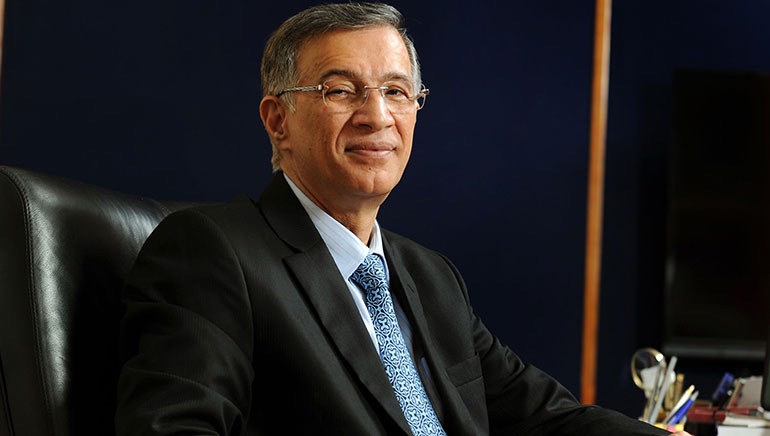Business
Union Budget 2024: Allocation of ₹10 lakh crore for PMAY, Housing sector welcomes the move
Published
2 years agoon

On Tuesday at 11:00 AM, Indian Finance Minister Nirmala Sitharaman announced the union budget for the fiscal year 2024-25. Giving preference to the Prime Minister’s dream of “housing for all”, ₹10 lakh crore has been allotted to the Pradhan Mantri Awas Yojna scheme (PMAY). Under this scheme, 3 crore affordable homes are to be built in the upcoming years. Realtors across the country welcomed the move by the Finance Minister, saying it will surely help India achieve its dream of homeownership.
Here’s what real estate mavens had to say about the budget:

Dr. Niranjan Hiranandani, Chairman, Hiranandani and NAREDCO
“India Inc. enthusiastically welcomes the Union Budget 2024, recognizing its focus on fiscal incentives and structural reforms that prioritize employment-centric sectors. The strategic emphasis on skilling through private sector internships, salary support, and CSR-funded training demonstrates a commitment to enhancing youth employability, positioning them as key growth drivers. The ₹10 lakh crore allocation under the PMAY Urban Scheme aims for 3 crore houses and promotes rental housing in industrial parks via PPP, along with 12 new industrial parks. With sustained infrastructure investments reflected in the ₹11.11 lakh crore Capex allocation, we expect a boost in affordable rental housing for industrial laborers. In essence, the budget reflects a strategic economic stimulus, maintaining India’s macro growth trajectory amid global uncertainties. It prioritizes skilling, tourism, MSMEs, education, urban development, and infrastructure, injecting vitality into the economy. Aligning the economic survey with budget outlays and aiming to cap the fiscal deficit at 4.9% will help control inflation and encourage credit borrowings. We rate this budget an 8 out of 10, recognizing its positive momentum and thoughtful direction, set to keep India shining brightly on the global stage. The measures are timely and impactful, setting the course for sustained economic growth.”

Prashant Sharma, President, NAREDCO Maharashtra
“We commend the Union Budget 2024-25 for its comprehensive approach to job creation and boosting consumption, benefiting the real estate sector. The Finance Minister’s announcement of a PM Package with ₹2 lakh crore for employment and skilling and ₹1.48 lakh crore for education and employment is a welcome move. These initiatives will enhance the economic landscape and increase demand for properties. The commitment to affordable housing, with a ₹2.2 lakh crore push under PM Awas Yojana-Urban, addressing housing for one crore families, is significant. Encouraging states to moderate high stamp duty rates and consider reductions for women buyers is a progressive measure. GST reforms and tax structure rationalization will further benefit the salaried class, boosting housing demand. Overall, the budget’s strategic moves towards urban infrastructure and industrial growth are commendable.”

Pritam Chivukula, Co-Founder & Director, Tridhaatu Realty and Vice President, CREDAI-MCHI
“We wholeheartedly welcome the Union Budget 2024-25, which aligns with market expectations and promotes economic growth. The budget addresses the needs of the Garib, Mahilayen, Yuva, and Annadata, highlighting key priorities. An outlay of ₹10 lakh crore for urban housing under PM Awas Yojana is a significant boost, benefiting urban populations. The ₹2.2 lakh crore initiative for affordable housing and the ₹2.66 lakh crore allocation for rural development will uplift living standards and discourage urban migration. Proposals for rental housing under PPP and reduced stamp duty for women buyers are commendable. Significant infrastructure investments and support for private investment will drive sustainable development. The budget embodies a progressive strategy for a promising future.”

Manju Yagnik, Vice Chairperson, Nahar Group and Senior Vice President, NAREDCO Maharashtra
“The Finance Minister’s budget addresses housing needs for 1 crore urban poor and middle-class families with a ₹10 lakh crore investment, significantly improving urban housing infrastructure. The PM Surya Ghar Muft Bijli Yojana, aiming to install rooftop solar panels, promotes sustainable living. Encouraging states to reduce high stamp duty rates and slashing duties for women is progressive. The budget’s focus on rental housing and urban development in 100 large cities reflects a forward-thinking approach, emphasizing inclusivity and sustainability.”

Keval Valambhia, COO, CREDAI-MCHI
“The Union Budget 2024-25 has introduced a forward-thinking and comprehensive vision for the real estate sector, bringing substantial benefits to urban centers like Mumbai. CREDAI-MCHI applauds the Union Budget for its visionary emphasis on education, skilling, MSMEs, and housing. The significant allocation for PM Awas Yojana, urbanization, and MSME support are poised to drive India’s and advance the ‘Housing for all’ mission. CREDAI-MCHI is highly encouraged by the budget’s potential to transform our industry. The Union Budget 2024-25 lays down a solid framework for the growth and development of the real estate sector. The focus on affordable housing, urban infrastructure, industrial development, and digitalization is especially advantageous for a dynamic and densely populated city like Mumbai. We are optimistic about the opportunities these initiatives will bring to the real estate sector and the broader economy. Nevertheless, the long-standing demand for declaring the real estate sector as an industry was once again ignored, which means high borrowing costs will still affect house prices across the country.”

Abhinandan Lodha, Chairman, The House of Abhinandan Lodha
“The 2024-2025 Budget is a growth-centric blueprint with profound implications on employment and employability through real estate, infrastructure, and tourism. This budget marks a significant shift towards holistic growth, focusing on affordable housing. The allocation of ₹2.2 lakh crore for constructing one crore houses in urban areas and two crore houses in non-urban areas demonstrates the government’s commitment to improving living standards. This initiative will generate substantial employment opportunities and bolster ancillary industries. The ₹1.5 lakh crore incentive for infrastructure development will enhance connectivity and drive growth across states. The PM Awas Yojana, with a budget of ₹10 lakh crore, alongside the rationalization of stamp duties, digitization of land records using GIS, and introduction of unique land parcel identification numbers for rural areas, reflect a forward-thinking approach. Additionally, the ₹10 trillion allocation for tourism and cultural corridor development will stimulate local economies. These measures are poised to invigorate the real estate sector, setting the stage for a robust economic future.”

Dhaval Ajmera, Director, Ajmera Realty & Infra India Ltd.
“The Union Budget 2024-25 reflects the growth-led vision of the government towards building a dynamic Viksit Bharat. The reforms announced by the honorable Finance Minister like enabling a stamp-duty cut for women homebuyers will act as a sense of encouragement for fence-sitters to make the move along with resonating a strong message for women empowerment. Keeping in check the motive to promote housing for EWS, the announcement about the allocation of additional 3 crore homes under PMAY along with interest subvention schemes about affordable homes will contribute to the vision of Housing for All. Overarching this, the ₹10 lakh crore outlay to boost urban housing under PMAY 2.0 will elevate the demand for affordable homes. The state-wise moderation of stamp duty rates is a strong move that will potentially enable relief to homebuyers from the stamp duty and registration charges, thus propelling housing demand across new and emerging markets. However, the sector still awaits the need to redefine the definition of affordable homes to include home sizes from 60 sq.m to 90 sq.m, rather than the current price bracket of ₹45 lakh, and incentivization to developers and homebuyers to develop and invest in green projects to save the environment. Overall, Budget 2024’s strategic investments and reforms are expected to drive substantial growth in the real estate sector, benefiting both developers and homebuyers alike.”

Chintan Vasani, Founder Partner and MD, Wisebiz Realty
“The removal of indexation benefit for long-term capital gains tax on real estate is a significant shift in the sector. Despite the lowered LTCG tax rate to 12.5%, this change could lead to an increased tax burden on real estate transactions. The aim is to simplify and rationalize the tax framework, highlighting the evolving landscape for real estate investments. The government’s initiative to encourage states to reduce stamp duty rates, especially for women, is geared towards promoting homeownership. This step has the potential to notably decrease the cost of property acquisition in India, a country where stamp duty rates rank among the highest globally.”

Rajiv Agrawal, Founder Partner, Saarathi Realtors
“The finance budget for 2024-25 focuses on employment, skilling, MSMEs, and the middle-class tax structure under the new regime. With ₹1.48 lakh crore allocated for education, jobs, and skill development, we anticipate increased investment in the realty sector, driven by a growing need for housing. The FM’s announcement of a ₹10 lakh crore investment in urban housing under PM Awas Yojana Urban 2.0 is a major boost for India’s real estate sector. PMAY 2.0 will benefit many slum dwellers in Mumbai, providing access to affordable, quality housing. The budget emphasizes integrating lower-income communities into the formal housing market, enhancing their quality of life and contributing to Mumbai’s urban development and social upliftment.”

Dharmendra Raichura, VP of Finance, Ashar Group
“The Union Budget’s visionary blueprint for India’s real estate sector under the Modi 3.0 government emphasizes employment-linked incentives, allocating funds for manufacturing job creation and employer support to ensure a robust workforce for growth. The unprecedented ₹10 lakh crore allocation for urban housing aims to meet the needs of 1 crore urban poor and middle-class families, marking a significant step towards sustainable urban development. Additionally, introducing rental housing for industrial workers under the PPP model and maintaining a capex outlay of ₹11.11 lakh crore underscores the government’s commitment to urban development.”

LC Mittal, Director, Motia Group
“The investment of ₹10 lakh crore in urban housing under PM AWAS Yojana Urban 2.0 marks a significant step towards addressing India’s urban housing crisis. This commitment to aid one crore families underscores the government’s dedication to inclusive urban development. The central contribution of ₹2.2 lakh crore over five years will bolster the scheme, potentially sparking job creation, stimulating the construction sector, and supporting allied industries. By accommodating diverse housing needs, this initiative aims to reduce urban inequality and improve living conditions in India’s rapidly growing cities.”

Aman Gupta, Director, RPS Group
“The ambitious goal of addressing the housing needs of one crore urban families under PM AWAS Yojana Urban 2.0 reflects the scale of India’s urban housing challenge. With urbanization projected to reach 50% by 2050, the ₹10-lakh-crore investment is both timely and necessary. The ₹2.2 lakh crore central assistance exemplifies a robust public-private partnership, potentially spurring innovative financing and construction technologies. By targeting both poor and middle-class families, the scheme aims to significantly reduce the urban housing shortage and transform India’s urban landscape.”

Anurag Goel, Director, Goel Ganga Developments
“The FM’s announcement of a ₹10 lakh crore investment in urban housing under PM AWAS Yojana Urban 2.0 is a major boost for India’s real estate sector. With ₹2.2 lakh crore in central assistance, the initiative can revitalize the affordable housing segment, aiming to provide housing for one crore families within five years. This translates to constructing about 20 lakh houses annually, which will drive demand for construction materials and revive related industries. The scheme’s focus on middle-class families, alongside the urban poor, promotes diverse housing solutions and supports the vision of ‘Housing for All.'”

Mayank Seth, Oneclick Realtors
“PM Awas Yojana-Urban 2.0 aims to provide housing for 1 crore poor and middle-class families, driving demand for affordable housing and boosting construction activities. With ₹2.2 lakh crore allocated for urban housing over five years, it will accelerate housing projects, improve infrastructure, and attract investment in urban real estate. Additionally, ₹10 lakh crore is earmarked for building 3 crore more houses under the Pradhan Mantri Awas Yojana, increasing urban and rural construction. Rationalising stamp duty, especially for women homebuyers, is expected to boost sentiment in major cities.”
You may like
-


Here’s why Adani is betting $100 Billion on Data Centers
-


Sterlite Group appoints Sumil Mathur as Group CFO
-


India’s young entrepreneurs are building billion-dollar startups
-


Anthropic opens India office in Bengaluru
-


Mankind Pharma Reinvents Global Supply Chain and Procurement with Accenture
-


“Don’t build first and fix later”


